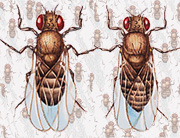Today, the various insecticides used in the home and, of course, in agriculture, have very few negative aspects for human health as well as for agricultural crops. The extensive use of these chemical substances is considered a major factor responsible for the loss of crops and also for damage to agricultural products that are stored

There is an innovation in the war against the insects that plague our lives: scientists in the USA suggest harming their sense of smell? That is, to "blind" them in this targeted way. According to their research, the development of insect repellents that focus on silencing the sense of smell of these small creatures is the future, also from an economic point of view.
Today, the various insecticides used in the home and, of course, in agriculture, have very few negative aspects for human health as well as for agricultural crops. The widespread use of these chemical substances is considered a major factor responsible for the loss of crops and also for damage to agricultural products that are stored.
In this ongoing and heated "battle" between humans and insecticides, Dr. Leslie Vosshall from the Rockefeller University in New York and his colleague Walton Jones, a biomedical expert from the Institute of Neurogenetics, together with the biotechnology company Santigan Biosciences, are now proposing the use of new means of warfare against The insects: they are designed to damage their sense of smell.
For the purpose of the study, four families of insects were examined, among them the fruit fly, which is a favorite of the scientists because it is attracted to rotten fruit, and three more, an insect that damages citrus fruits, the moth worm that causes enormous damage to corn, cotton and tomato crops, and the malaria mosquito that bites humans. It turns out that in all these insects a single gene is responsible for their sense of the moon. In other words: it plays a key role in the evolution of insects, even though many changes have occurred in this group of living creatures over a quarter of a billion years.
All insects have very sensitive olfactory systems but different preferences. In their olfactory systems there is a sensitive smell receptor that is preserved in its functional capacity despite the fact that these are completely different insects from each other. The fruit fly has 62 olfactory receptors but only one, labeled Or83b, is actually the one that plays a central role in the sense of smell of these flies. When this particular gene is removed from the flies, they "go blind" or rather are unable to distinguish between different types of smell.
The researchers also examined the nervous system involved in the insect's sense of smell. It turns out that the insects are equipped with a system of tiny hairs in hexagons, their "antennae" and those that come in contact with the smells in the air. Through tiny holes in these hairs, the odors connect to the receptors at the ends of the nerve cells. When they hit the particular garden? The olfactory receptors find it difficult to detect the odors and do not transmit the information to the ends of the nerve cells, the dendrites. The result: the insect is blind, and completely paralyzed by smell.
The research team therefore proposes to focus on this goal in order to develop new insecticides, much more effective than the existing ones and also ones that will not cause harmful side effects, including to human health.
Alex Doron, Maariv
